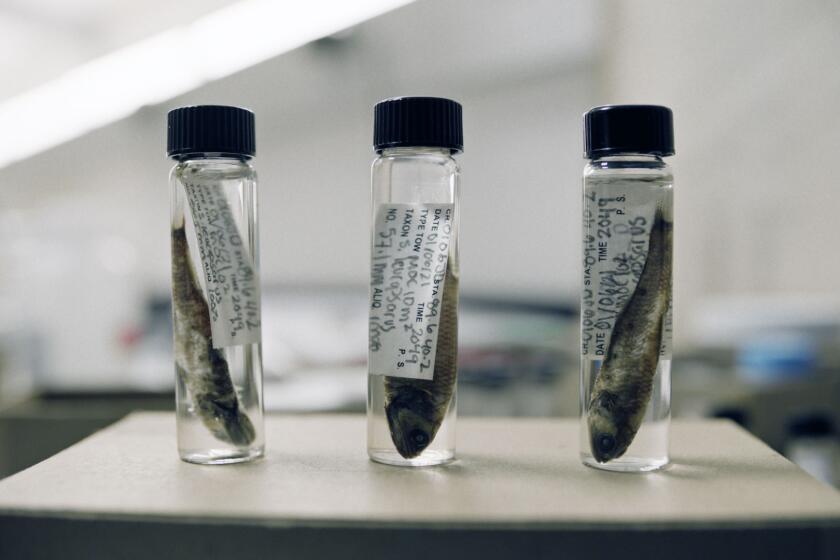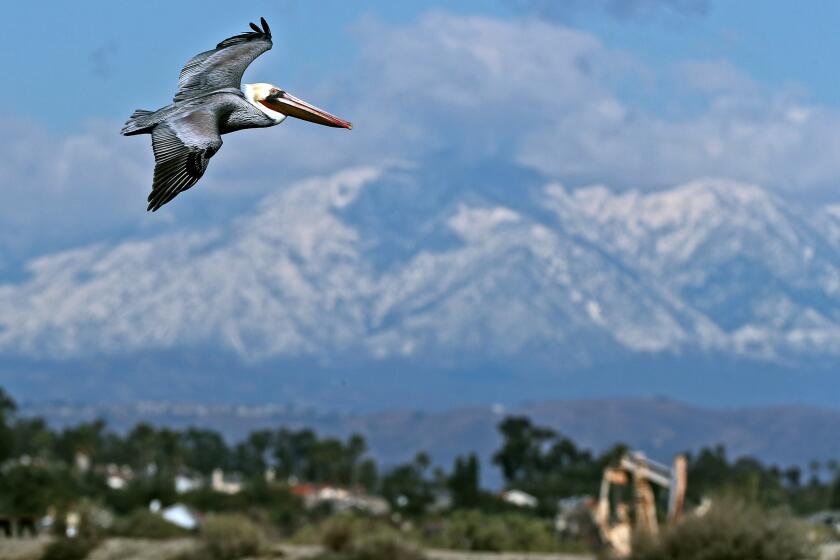Squawking at Bird Flu Warning
It’s an unlikely subject for a hit pop song:
“Shot, shot, shot. Give the roosters a shot! Shot, shot, shot. Protect Thai people!” blares the peppy tune from Thai troubadour Ad Carabao.
Ad’s band rose to the top of the charts here by singing about the struggles of common people. His lyrics address the exploitation of low-wage workers, gay rights and, most recently, the merits of his popular energy drink, Carabao Dang.
But seldom has he tackled a subject this dear to the hearts of his countrymen.
“Vaccinate roosters, to protect against their extinction,” Ad sings in “Vaccine for Life,” a track on his latest CD, “Big Mouth 5: Bird Flu,” which has sold 100,000 copies.
“To kill chickens -- this must be a crazy or stupid policy!”
The object of Ad’s ire is a push by the government to quell the spread of deadly avian influenza by banning cockfights and exterminating some of the prized birds.
Bird flu has killed 12 people in Thailand, about 20% of worldwide fatalities. Fighting cocks have been implicated in at least two deaths.
“You have to try to convince people to cooperate, to change their way of living,” said Education Minister Chaturon Chaisang, who led a federal committee charged with stopping the spread of bird flu. “The bottom line is to prevent people from being infected.”
But asking Thais to give up cockfighting is like asking Americans to abandon baseball.
Millions of Thais raise competitive birds, which can sell for as much as $20,000. Before bird flu, up to 30 million people attended cockfights each year.
Ad, who estimates he has raised 1,000 fighting cocks in his 50 years, has devoted himself to defending the sport. He poses for the covers of cockfighting magazines and produces concerts to stir the faithful.
He heads the Assn. of Thai Fighting Cocks Career Promotion, which claims 100,000 members.
“It’s a way of life,” Ad said from his rooster ranch in Bangkok as he cradled North Star, a champion 8-pound middleweight with a brilliant red crest over jet black feathers -- just like the Carabao band logo.
*
Before Ad Carabao became a rock star, he was Yuenyong Opakul, an earnest kid who grew up surrounded by rice paddies and ancient temples in Suphan Buri, about 60 miles northwest of Bangkok.
Like other children in rural Thailand, he had a single, abiding passion.
“I’d come home from school and there would be cockfighting everywhere,” said the wiry, long-haired singer, who resembles Carlos Santana.
As a youth, he would often wake up early and spend the entire day with his birds.
Ad’s father was a teacher and newspaper reporter who also sang at local parties. “My father was the leader of the band ... like Tom Jones,” he said.
Taught by his dad, Ad formed a band in high school and, after graduation, moved to Bangkok in the early 1970s, playing guitar and harmonica in clubs and restaurants to support himself through college.
After a stint in the Philippines studying architecture, Ad returned to Bangkok to work on government development projects and play with his new band, named Carabao, after the tough workhorse of Asia -- the water buffalo.
Ad, the lead singer, guitarist and lyricist, was a poet with an edge. The band spit out tunes about government injustice, logging of the rain forest and the plight of young prostitutes.
Carabao rocketed to fame in the early ‘80s with the hit “Made in Thailand,” about the export of locally produced products that were then sold back to Thai consumers at a hefty premium.
The group became the hottest act in the pleng phua cheewit genre -- “songs for life.”
Today, Ad is the laid-back elder statesman of Thai rock ‘n’ roll. He lives at the center of a maze of poorly paved roads, peppered by fruit and soda stands, in the northeast corner of sprawling Bangkok. Ad’s country ranch includes a luxury home, a recording studio and rows of rooster cages. He cruises the neighborhood on a Harley-Davidson.
Soon after bird flu struck in 2003 -- and the government began its campaign to kill or restrict fighting cocks -- Ad recognized a natural pleng phua cheewit.
Sipping a can of beer in Bangkok’s steamy morning heat, he explained: “I don’t like the way the government lies.”
“Like Americans taking Viagra when their cuckoo bird stops cooing, take medicine when you have a headache,” Ad sings in “Vaccine for Life.”
“Why be afraid of bird flu?”
*
There is good reason to fear.
Since surfacing in Hong Kong in 1997, the H5N1 strain of the avian flu virus has spread throughout Southeast Asia.
Each time a human is infected, it increases the chance that the virus will mutate into a form easily transmitted among people.
Fifty-seven people have died of bird flu since 2003, according to the World Health Organization.
Asia’s densely packed populations of people, birds and other animals have made it a genetic hothouse perfect for breeding a killer virus.
“Charles Darwin could not have set up a better genetic re-assortment laboratory if he tried,” said Michael Osterholm, who directs an infectious disease research center at the University of Minnesota.
Millions of farm birds have been killed, but because the virus is carried by wild migrating fowl, it continues to spread. This year, serious outbreaks have been reported in western China, Siberia and Mongolia, and experts expect the virus to spread to India and Europe.
Thailand, once the fourth-largest chicken exporter in the world, is at the epicenter of the epidemic. After initially underestimating the problem, the Thai government responded with a vengeance.
More than 40 million chickens and waterfowl were exterminated. Surveillance teams checked birds nationwide. Border police cracked down on bird smuggling from Cambodia.
“This thing is not about the flu,” Ad said. “It’s about the government -- the people who just think about money.”
Fighting cocks, which are taken from stadium to stadium, have been a prime government target.
The Khonlehodai arena in Suphan Buri is just a few miles from where Ad grew up. This is the heart of cockfighting country. It is also the heart of Thailand’s bird flu outbreak, having lost more birds to the disease than any other region.
Inside the hangar-sized arena, trainers rubbed down each rooster with cooling lemongrass tea.
Cocks in the ring flared their plumage and spewed kicks and pecks.
The crowd of about 250 cheered lustily. “Ped-see! Ped-see!” the crowd yelled, mimicking the sound of a bird’s feet hitting their target.
Seats around the center ring filled with fans who paid $1.25 for admission. A ringside seat, where a skittish cock often flaps into a spectator’s lap, costs $2.50.
“We are crazy about people who have great courage -- tough people,” said Chai Wacharonke, deputy president of Ad’s cockfighting association. “This is like a war by proxy.”
Between rounds, a boy sewed a bloody gash in his bird’s head, like a trainer tending to a cut boxer. After sticking himself with the needle, he winced and sucked on his bare finger.
Another teen, clad in denim shorts stained by bird droppings, struggled to restrain his flapping bird. The boy needed both hands to hold the bird, so he held the rag used to wipe the chicken’s blood and mucous in his mouth.
Last fall, a young man cleared his bird’s air passages using his mouth to suck mucous through the rooster’s nostrils.
He died of bird flu.
*
The Thai government has tried various means of quelling the epidemic short of simply slaughtering every chicken and duck in the country.
Officials proposed tracking roosters with microchips embedded under the skin, to see whether outbreaks occur where the birds travel. Authorities have begun requiring documentation certifying that fighting cocks are flu-free.
It’s futile.
“There are millions and millions of chickens,” said Kloy Mahoran, a retired civil servant, as he waited for a bout at Suphan Buri with his top fighter, Greeny. “There is no way they can keep their eyes on every one.”
Authorities banned cockfights last fall, but illegal bouts surged. The government relented and allow limited cockfighting this year.
Ad kept pressing his campaign for widespread chicken vaccination, singing his heart out on the subject.
“Vaccinate roosters to protect against their extinction,” he sings in “Vaccine for Life.” “Better than using a knife cutting relationships between the government and the people.”
But there is a problem. Vaccines do not protect against all strains of bird flu. And although an injection could save a rooster’s life, it could also turn the bird into a disease carrier.
Japan, a top chicken importer, rejects birds from countries that permit vaccination.
Last fall, the Thai government outlawed vaccines and imposed a penalty of up to five years in prison for violators.
Ever defiant, Ad vaccinated his prize roosters and urged others to do the same.
Partly because of his stinging campaign, he also scored two meetings with Prime Minister Thaksin Shinawatra last year.
“Thaksin said he wanted to allow people to use the vaccine ... but quietly,” Ad said, sealing his lips with an index finger.
He added, with a smile: “So, I’ve won.”
Not so fast.
In August, the government slapped a new ban on cockfights.
And so it goes.
Ad pecks, the government scratches.
Meanwhile, migratory birds are flying thousands of miles across Southeast Asia on their way to China and beyond.
No one can stop them.
In a few more months, the birds will make their way back to Thailand.
“We all know that we face disease and danger,” Ad sings in “Vaccine for Life.” “We all need to learn how to survive.”
More to Read
Start your day right
Sign up for Essential California for news, features and recommendations from the L.A. Times and beyond in your inbox six days a week.
You may occasionally receive promotional content from the Los Angeles Times.






